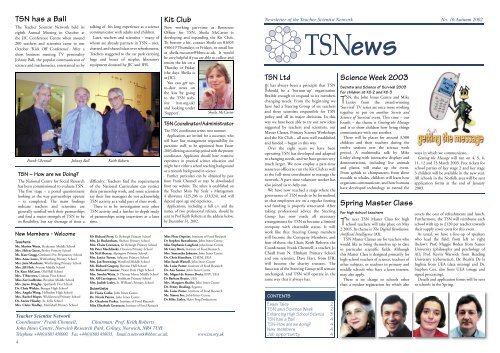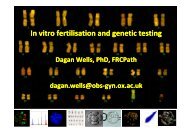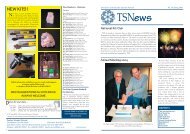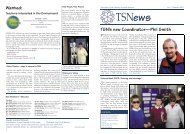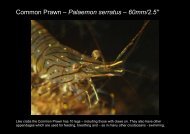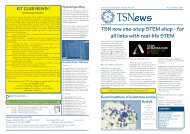TSNews No 16 - Teacher Scientist Network
TSNews No 16 - Teacher Scientist Network
TSNews No 16 - Teacher Scientist Network
Create successful ePaper yourself
Turn your PDF publications into a flip-book with our unique Google optimized e-Paper software.
TSN has a Ball<br />
The <strong>Teacher</strong> <strong>Scientist</strong> <strong>Network</strong> held its<br />
eighth Annual Meeting in October at<br />
the JIC Conference Centre when around<br />
200 teachers and scientists came to our<br />
October ‘Kick Off Conference’. After a<br />
short business meeting TV personality<br />
Johnny Ball, the popular communicator of<br />
science and mathematics, entertained us by<br />
New Members - Welcome<br />
<strong>Teacher</strong>s<br />
Ms. Marion Watts, Hethersett Middle School<br />
Mrs. Helen Green, Brisley Primary School<br />
Ms. Kate Gragg, Gresham’s Pre-Preparatory School<br />
Mrs. Anne Lowe, Winfarthing Primary School<br />
Mrs. Jane Marchant, Winfarthing Primary School<br />
Mrs. Jill Holt, Avenue Middle School<br />
Dr. Kate McCann, Old Hall School<br />
Mrs, T Burrows, Colman First School<br />
Miss Zoë Ladbroke, Breydon Middle School<br />
Mrs. Jayne Dingley, Sparhawk First School<br />
Dr. Chris Wiskin, Bungay High School<br />
Mrs. Angela Wang, Hellesdon High School<br />
Mrs. Rachel Mapes, Wicklewood Primary School<br />
Dr. Anrew Hinsley, St. Felix School<br />
Mrs. Claire Findlay, Mattishall Primary School<br />
<strong>Teacher</strong> <strong>Scientist</strong> <strong>Network</strong><br />
Coordinator: Frank Chennell, Chairman: Prof. Keith Roberts<br />
John Innes Centre, <strong>No</strong>rwich Research Park, Colney, <strong>No</strong>rwich, NR4 7UH<br />
Telephone +44(0)<strong>16</strong>03 450000, Fax +44(0)<strong>16</strong>03 450015, Email ts.network@bbsrc.ac.uk,<br />
4<br />
TSN – How are we Doing?<br />
The National Centre for Social Research<br />
has been commissioned to evaluate TSN.<br />
The first stage – a postal questionnaire<br />
looking at the way partnerships operate<br />
– is completed. The main findings<br />
indicate teachers and scientists are<br />
generally satisfied with their partnerships<br />
and find a major strength of TSN to be<br />
its flexibility, but say shortage of time a<br />
talking of his long experience as a science<br />
communicator with adults and children.<br />
Later, teachers and scientists – many of<br />
whom are already partners in TSN – met,<br />
chatted, and shared ideas over refreshments.<br />
<strong>Teacher</strong>s staggered to the car park carrying<br />
bags and boxes of surplus laboratory<br />
equipment donated by JIC and IFR.<br />
Frank Chennell Johnny Ball Keith Roberts<br />
difficulty. <strong>Teacher</strong>s find the requirements<br />
of the National Curriculum can restrict<br />
their partnership work, and some scientists<br />
say their line managers do not acknowledg<br />
TSN activity as a valid part of their work.<br />
There is to be investigation into other<br />
TSN activity and a further in-depth study<br />
of partnerships using interviews at a later<br />
time.<br />
Mr Richard Perry, Gt Ryburgh Primary School<br />
Mrs. Jo Buckenham, Shelton Primary School<br />
Mrs. Claire Lawrence, Gt Ryburgh Primary School<br />
Mr Peter Muchlinski, Hoveton Primary School<br />
Mr Neil Henery, Alpington Primary School<br />
Mrs. Janice Turner, Aslacton Primary School<br />
Mrs. Jan Browning, Horsford Middle School<br />
Mr. Richard Gregory, Beeston Hall School<br />
Mr. Richard Cranmer, <strong>No</strong>tre Dam High School<br />
Mrs. Sandra Watts, St Thomas Moore Middle School<br />
Mr. Alf Carrington, Foulsham Primary School<br />
Mrs. Judith Lesley, St. William’s Primary School<br />
<strong>Scientist</strong>s<br />
Dr. Fiona Corke, John Innes Centre<br />
Dr. Nicola Patron, John Innes Centre<br />
Dr. Charlotte Parker, Institute of Food Research<br />
Miss Elizabeth Greenacre, Institute of Food Research<br />
Kit Club<br />
<strong>No</strong>w working part-time as Resources<br />
Officer for TSN, Sheila McCarter is<br />
developing and expanding the Kit Club.<br />
To borrow a kit, contact Sheila on 0<strong>16</strong>03<br />
450619 Thursdays or Fridays, or email her<br />
at sheila.mccarter@bbsrc.ac.uk. It would<br />
be very helpful if you are able to collect and<br />
return the kit on a<br />
Thurday or Friday<br />
(the days Sheila is<br />
at JIC).<br />
You can get upto-date<br />
news on<br />
the kits by going<br />
to the TSN website<br />
(tsn.org.uk)<br />
and looking under<br />
‘Support’.<br />
Sheila McCarter<br />
TSN Coordinator/Administrator<br />
The TSN coordinator retires next summer.<br />
Applications are invited for a successor, who<br />
will have line management responsibility for<br />
part-time staff, to be appointed from Easter<br />
2003 allowing an overlap period with the present<br />
coordinator. Applicants should have extensive<br />
experience in practical science education and<br />
might have either a school teaching background<br />
or a research background in science.<br />
Further particulars can be obtained by post<br />
from Frank Chennell or may be downloaded<br />
from our website. The salary is established on<br />
the <strong>Teacher</strong> Main Pay Scale + Management<br />
4 allowance (£25,206 to £33,324), and will<br />
depend upon age and experience.<br />
Applications, including a full c.v. and the<br />
names of two professional referees, should be<br />
sent to Prof Keith Roberts at the address below,<br />
by December 31, 2002.<br />
Miss Flore Depeint, Institute of Food Research<br />
Dr Stephen Rawsthorne, John Innes Centre<br />
Miss Stephanie Langford, John Innes Centre<br />
Mr Gary Brett, Institute of Food Research<br />
Mrs. Samantha Johnson, John Innes Centre<br />
Dr. Chris Hamilton, CHEM, UEA<br />
Miss Sarah Wastell, John Innes Centre<br />
Ms. Luise Potter, Institute of Food Research<br />
Dr. Ana Santos, John Innes Centre<br />
Mr. Miguel de Franca Doria, ENV, UEA<br />
Dr Barbara Bruno, UEA<br />
Mrs. Margaret Shailer, John Innes Centre<br />
Dr. Penny Brading, Sygenta<br />
Ms. Luise Potter, Institute of Food Research<br />
Mr. Simon Fox, John Innes Centre<br />
Dr Mike Linley, Hairy Frog Productions<br />
www.tsn.org.uk<br />
Newsletter of the <strong>Teacher</strong> <strong>Scientist</strong> <strong>Network</strong> <strong>No</strong>. <strong>16</strong> Autumn 2002<br />
TSN Ltd<br />
It has always been a principle that TSN<br />
should be a ‘bottom-up’ organisation<br />
flexible enough to respond to its members<br />
changing needs. From the beginning we<br />
have had a Steering Group of six teachers<br />
and three scientists responsible for TSN<br />
policy and all its major decisions. In this<br />
way we have been able to try out new ideas<br />
suggested by teachers and scientists; our<br />
Master Classes, Primary Science Workshops<br />
and the Kit Club – all now well established<br />
and funded – began in this way.<br />
Over the eight years we have been<br />
operating TSN has developed and adapted<br />
to changing needs, and we have grown very<br />
much larger. We now employ a part-time<br />
resources officer to run the Kit Club as well<br />
as the full-time coordinator to manage the<br />
network. A part-time volunteer worker has<br />
also joined us to help out.<br />
We have now reached a stage where the<br />
governance of TSN needs to be formalised<br />
so that employees are on a regular footing<br />
and funding is properly structured. After<br />
taking professional advice the Steering<br />
Group has now made all necessary<br />
arrangements for TSN to become a limited<br />
company with charitable status. It will<br />
work like this: Steering Group members<br />
will become the Company Members, and<br />
four of these, the Chair, Keith Roberts; the<br />
Coordinator, Frank Chennell; a teacher, Jo<br />
Cheall from N. Elmham Primary School<br />
and one scientist, Dave Hart, from IFR,<br />
will become the charity trustees. The<br />
function of the Steering Group will remain<br />
unchanged, and TSN will operate in the<br />
same way that it always has.<br />
CONTENTS<br />
Essex Tales 2<br />
TSN and Science Week 2<br />
Enhancing High School Science 3<br />
TSN has a Ball 4<br />
TSN–How are we doing? 4<br />
New members 4<br />
Job opportunity 4<br />
<strong>TSNews</strong><br />
Science Week 2003<br />
Secrets and Science of Survival 2003<br />
For children at KS 2 and KS 3<br />
TSN, the John Innes Centre and Mike<br />
Linley from the award-winning<br />
‘Survival’ TV series are once more working<br />
together to put on another Secrets and<br />
Science of Survival event. This time – our<br />
fourth – the theme is Getting the Message<br />
and is to show children how living things<br />
communicate with one another.<br />
There will be places for around 3,500<br />
children and their teachers during the<br />
twelve sessions over the science week<br />
period. A multimedia talk by Mike<br />
Linley along with interactive displays and<br />
demonstrations, including live animals<br />
and plants, will make up the event.<br />
From aphids to chimpanzees, from slime<br />
moulds to whales, children will learn how<br />
organisms communicate, and how humans<br />
have developed technology to extend the<br />
Spring Master Class<br />
For high school teachers<br />
The next TSN Master Class for high<br />
school teachers will take place on May<br />
2 2003. Its theme is The Digital Revolution:<br />
Artificial Intelligence (AI).<br />
TSN Master Classes are for teachers who<br />
would like to bring themselves up to date<br />
in particular scientific fields. Although<br />
this Master Class is designed primarily for<br />
high-school teachers of science, teachers of<br />
other subjects, or teachers in primary and<br />
middle schools who have a keen interest,<br />
may also apply.<br />
There is no charge to schools other<br />
than a modest registration fee which also<br />
ways in which we communicate.<br />
Getting the Message will run on 4, 5, 6,<br />
11, 12 and 13 March 2003. Free tickets for<br />
school parties of key stage 2 and key stage<br />
3 children will be available in the new year.<br />
All schools in the <strong>No</strong>rfolk area will be sent<br />
application forms at the end of January<br />
2003.<br />
covers the cost of refreshments and lunch.<br />
Furthermore, the TSN will reimburse each<br />
school with up to £120 per teacher towards<br />
their supply cover costs for this event.<br />
As usual, we have a line-up of speakers<br />
who lead the field: from left to right<br />
(below): Prof. Maggie Boden from Sussex<br />
University (philosophy and psychology of<br />
AI); Prof. Kevin Warwick from Reading<br />
University (cybernetics); Dr. Beatriz De la<br />
Inglisia from UEA (data mining) and Dr.<br />
Stephen Cox, also from UEA (image and<br />
signal processing).<br />
Details and application forms will be sent<br />
to schools in the Spring.
Essex Tales<br />
Phil Smith<br />
John MInnes Centre<br />
axine Woods (my teacher partner) and<br />
I are fortunate that we are able to work<br />
with the same set of pupils for the whole day<br />
Habitats in the schools grounds<br />
TSN & National<br />
Science Week<br />
Wendy Harwood<br />
John Innes Centre<br />
Dr. Wendy Harwood and her TSN partner<br />
Dr. Charles Hill together initiated a<br />
Biotechnology Awareness Day as part of this<br />
years’ National Science Week.<br />
Sixth-form students from Wymondham<br />
College, Wymondham High School and<br />
Attleborough High School converged on<br />
Wymondham College for this day-long event<br />
in which the students learned how to handle<br />
micropipettes, set up restriction digests and<br />
load agarose gels as part of ‘hands-on’<br />
investigations into Genetic Fingerprinting<br />
and Bacterial Transformation.<br />
Eighty-five pupils arrived, many of them<br />
getting their first practical experience<br />
of molecular biology. In between the<br />
incubations and gel-staining the students got<br />
the chance to meet with JIC scientists Lorelei<br />
now that we are based at a primary school in<br />
Essex. We can focus on science days with the<br />
children which inevitably become much more<br />
than ‘just science’.<br />
We began with a Cells and DNA Discovery<br />
day on my first visit to the primary school.<br />
We both thought this might have been a bit<br />
ambitious for Year 5 but by using<br />
interactive drama and a slide show<br />
(based upon the JIC/TSN Cell<br />
City production) they grasped the<br />
basic ideas. We then built on these<br />
with a range of practical activities<br />
throughout the day.<br />
Scientific washing up<br />
Bilham, Judith Harden and Phil Smith who<br />
joined Wendy and Charles to help out.<br />
The day also included a DNA polymerase<br />
chain reaction demonstration and a couple<br />
of background talks which helped put the<br />
Our “Environmental Science” day was<br />
good fun with the children rummaging<br />
through bags of rubbish realising just how<br />
much waste we generate and how much<br />
of it can be recycled. We have also found<br />
some very simple activities work well – we<br />
organised a day of Investigative Science with<br />
pupils planning simple investigations into<br />
the properties of materials for designing<br />
‘Santa’s Sack’ and learning to use binocular<br />
microscopes by reading shrunken text from<br />
Harry Potter. How many times have we all<br />
shown kids things under microscopes and<br />
not been sure what they are looking at? This<br />
activities in context.<br />
The event was made possible due to<br />
backing from the <strong>No</strong>rfolk Education Business<br />
Exchange and a grant for National Science<br />
Week from the BBSRC.<br />
Sixth formers examine gels<br />
is a great way to know they are using the<br />
microscope correctly.<br />
Our biggest project was for National<br />
Science Week for which we were awarded<br />
a BBSRC grant: we transformed the school<br />
into a ‘home’ for the day. The children then<br />
worked their way around the home looking<br />
at a different aspect of science associated with<br />
each of the six different rooms: the kitchen,<br />
bathroom, dining room, study, workshop<br />
and the garden. For example in the ‘scientific<br />
washing-up’ activity they investigated the<br />
action of detergents in the kitchen.<br />
Enhancing the<br />
Secondary Science<br />
Curriculum<br />
Liz Drake<br />
Long Stratton High School<br />
was very pleased when Dr Nicola Patron<br />
I from the John limes Centre offered to<br />
work with my secondary pupils, as many<br />
TSN partnerships are formed within primary<br />
schools. I felt that here<br />
was a real opportunity to<br />
enhance the secondary<br />
science curriculum with<br />
visits from a working<br />
scientist.<br />
During our initial<br />
meeting, I realised that<br />
the project could be<br />
designed to solve two<br />
concerns at the same<br />
time. Whilst teaching Year 10 pupils, I found<br />
that they had very little experience with full<br />
scale investigations, and were therefore really<br />
struggling with their first piece of coursework<br />
as required for the ‘Sc 1’ component of the<br />
GCSE curriculum. I had also been teaching<br />
a top set Year 9 group who needed extending<br />
due to boredom with the spiral curriculum,<br />
so it was decided to work with these high<br />
flyers and create time for some serious<br />
investigative work in preparation for their<br />
GCSE coursework next year.<br />
Nicola’s first visit was spent explaining her<br />
career path, and allowing pupils to handle her<br />
thesis, as well as discussing how the scientific<br />
community works. The impact of that first<br />
visit alone was enormous. Several girls in<br />
the class said that they now wanted to be<br />
scientists and it had given them the impetus<br />
to aim for high grades at GCSE next year.<br />
Nicola had spoken openly and honestly about<br />
both positive and negative aspects of a career<br />
in science, but had convinced them without<br />
referring to it specifically that girls can be<br />
scientists too!<br />
The pupils worked<br />
in groups to come<br />
up with ideas for<br />
investigations that<br />
would answer their<br />
queries on plant<br />
growth. Nicola<br />
discussed the<br />
validity of their<br />
proposals and left<br />
pupils to make<br />
adjustments where<br />
necessary. Before<br />
her next visit, I<br />
taught the class how<br />
to write a plan for<br />
their investigation<br />
based on the criteria<br />
for achieving a<br />
Level 6 in an ‘Sc1’<br />
at GCSE. We then<br />
used these plans to<br />
workout equipment<br />
The impact of that<br />
first visit alone was<br />
enormous. Several<br />
girls in the class said<br />
that they now wanted<br />
to be scientists.<br />
requirements, and<br />
spent further time<br />
in class encouraging<br />
pupils to think<br />
about how they were going to record results,<br />
another ‘Sc1 ‘ skill!<br />
By the time the pupils<br />
Nicola Patron with GCSE pupils<br />
set up their experiments,<br />
I had been asked to take<br />
over an absent colleague’s<br />
GCSE group and a<br />
student teacher inherited<br />
the year 9 class. Nicola<br />
kindly stayed with the<br />
project and assisted<br />
with the practical work,<br />
whilst Elaine was happy to allow class time<br />
Amy Masters, Hannah Dade, Helen Youngman<br />
and Claire Pitcherde show their results on water<br />
and light deprivation on plant growth<br />
for watering plants and recording results.<br />
On completion of the experiments, each<br />
group had to produce (in imitation of real<br />
scientists), a poster showing their results, and<br />
give a presentation on their findings.<br />
The enthusiasm that this project<br />
engendered, even with the most cynical pupil,<br />
was enjoyable to watch and realising that the<br />
best plan had been written by the weakest<br />
student, was an unexpected pleasure. Nicola<br />
is already hatching new ideas for next year,<br />
and I can’t wait to see the positive impact on<br />
another set of kids!<br />
2 3


